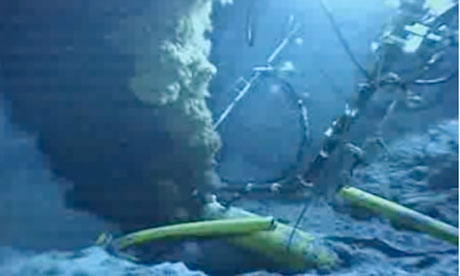-

- guardian.co.uk, Monday 24 May 2010

A video grab showing oil gushing from the ocean floor in the Gulf of Mexico following the explosion of a BP-owned oil rig. Photograph: http://globalwarming.house.gov/spillcam
In the month since BP's oil rig exploded in the US Gulf Coast, what has struck me the most is not, unfortunately, the magnitude of the spill, the damage caused that is likely to continue for decades, the inability of BP or federal agencies to clean up – much less stop – the spill, or the revelations of BP's pre-explosion lobbying, which likely contributed greatly to the disaster taking place.
I have instead been most moved by the rapid, overwhelming and broad-based demand from people all across the US and the world for a fundamental rethinking of just how far they are willing to let Big Oil go in pursuit of the world's remaining oil.
As I prepare for the annual general meeting of the fourth largest global oil company – Chevron (BP is the third largest) – I am confronted daily by people who are looking around their own communities and out across the world with new-found attention to the deep costs paid every day for our oil addiction.
A new alternative annual report for Chevron, The True Cost of Chevron, of which I am an author and the editor, will be released at a press conference on 25 May in Houston, Texas – just a few hundred miles from the sites where oil is washing up on shore following the explosion on BP's rig. Written by dozens of authors from 16 countries and 10 states from across the US who either live in, or advocate on behalf of, communities where Chevron operates, the report criticises Chevron's record on human rights, the environment, the climate, public health, worker safety and treatment of indigenous populations.
From Chevron's coalfields in Alabama to its oil wells in Indonesia, the report examines operations mired in accusations of human rights abuse (Angola, Burma, Indonesia, Chad and Nigeria); mass environmental and human health devastation (including Ecuador, Kazakhstan and Canada); toxic abuse of its neighbours (including Alabama, California, Mississippi, Texas, Thailand and the Philippines); abuse of its workers (including Utah); threats to endangered species (including Australia and the US Gulf Coast); and, in Iraq, intensifying the violent insurgency and putting the lives of US and Iraqi service members at greater risk.
There is also a powerful silver lining. All of these authors are part of a global resistance movement bringing its message to Houston where Chevron is hosting its AGM.
It has likely been 40 years since the American public in particular, was so ready to hear and embrace this message. In 1969, a Unocal (now Chevron) oil platform off the coast of California experienced a massive blowout and the issue forced its way to the nation's attention. Activists organised against offshore drilling in their community, ultimately enlisting millions of supporters and advocates, spawning a massive environmental movement which, within just a few years, achieved the establishment of the US Environmental Protection Agency and the passage of the US Clean Air and Clean Water Acts.
The communities most directly harmed by oil's abuse are organised, networked and ready. The public is roused, angered and ready to act. The oil corporations are on notice: the true cost of their operations is simply too great to bear. For as long as we continue to use oil, the operations of its providers will be restricted, reined in, regulated and, ultimately, retired.

0 Comentarios:
Publicar un comentario
Suscribirse a Comentarios de la entrada [Atom]
<< Página Principal